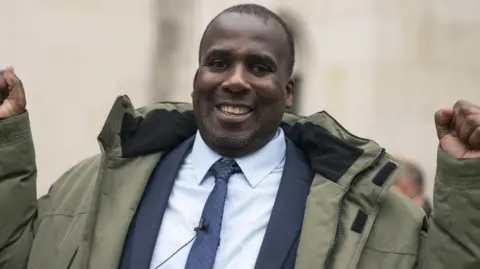Conviction for 1990 murder quashed decades later

 PA
PA
A man with learning disabilities who says he felt under pressure to confess to murder has had his conviction quashed after 33 years.
Three judges ruled on Wednesday that Oliver Campbell’s 1991 conviction for the murder of Baldev Hoondle in east London the previous year was “unsafe”.
Mr Campbell, now in his 50s, said he can start his life as an innocent man.
His purported confession at the time was made up amid the stress of being interviewed, judges have previously heard.
In 1991, Mr Campbell was jailed for life over the murder of Mr Hoondle, who had been shot dead in Hackney during a botched robbery carried out by two men.
His lawyers and supporters say his confession at the time simply mirrored what he had watched on BBC’s Crimewatch.
Mr Campbell was released on a life licence in 2002 and lives on his own in Felixstowe, Suffolk, with the assistance of a close group of friends and helpers.
In their ruling, Lord Justice Holroyde, sitting with Mr Justice Bourne and Mrs Justice Stacey, said they had “concluded that the convictions are unsafe”.
Earlier, Mr Campbell told the PA news agency: “The fight for justice is finally over after nearly 34 years. I can start my life an innocent man.”
‘Ollie’s life starts now’
His supporters added: “We are all in tears. Ollie’s life starts now.”
Mr Campbell suffered a brain injury when he was a baby. Experts say the injury has badly affected his memory and general ability to process more than basic information, leaving him suggestible and vulnerable to potential manipulation.
His barrister, Michael Birnbaum KC, told the court earlier this year that there were “ample” grounds to find the conviction unsafe, suggesting that he was “badgered and bullied” by police into giving a false confession over his involvement.
Mr Birnbaum said that Mr Campbell’s learning disabilities meant he made admissions which were “simply absurd”, and “nonsense”, and contained a “litany of inconsistencies” against the facts of the case
Lord Justice Holroyde said in the ruling: “We accept that, considered in the light of the fresh evidence, the rulings might be different.”
He continued: “A jury knowing of the fresh evidence would be considering the reliability of those confessions in a materially different context.
“In those circumstances, we cannot say that the fresh evidence could not reasonably have affected the decision of the jury to convict.”
After Mr Campbell was arrested in late 1990, he was interviewed 14 times by detectives as they sought to build a case to prove that the then 19-year-old had pulled the trigger.
Officers at Hackney Police Station had recognised that Mr Campbell had learning difficulties and for the first 10 of the interviews local social services had provided an adult to assist him.
His lawyers believe the purported confession may have therefore been inspired by what he had remembered from the TV, as he tried to end the repeated questioning.
Speaking to BBC’s Newsnight previously, Mr Campbell said the trauma of his conviction had destroyed his life and he demanded an investigation.
“It’s disgusting what’s happened to me,” said Mr Campbell. “That’s all I’ve got to say, it’s disgusting how different people out there got away with what they’re done to me in my life in 1991.”
He added that he had lost contact with most of his friends and my family.
Mr Campbell continued: “It’s like in a room and there’s no way out, like, the door’s are locked – there are no doors or windows.
“I’m an innocent person in the justice system and in the prison system. The justice system put me there.”
The quashing of the conviction comes 20 years after the Criminal Cases Review Commission, the miscarriages of justice body, rejected his pleas for help – and after two inquiries were triggered into how it had handled the case of Andy Malkinson, who was cleared of rape after a 20-year campaign.
This breaking news story is being updated and more details will be published shortly. Please refresh the page for the fullest version.
You can receive Breaking News on a smartphone or tablet via the BBC News App. You can also follow @BBCBreaking on Twitter to get the latest alerts.







